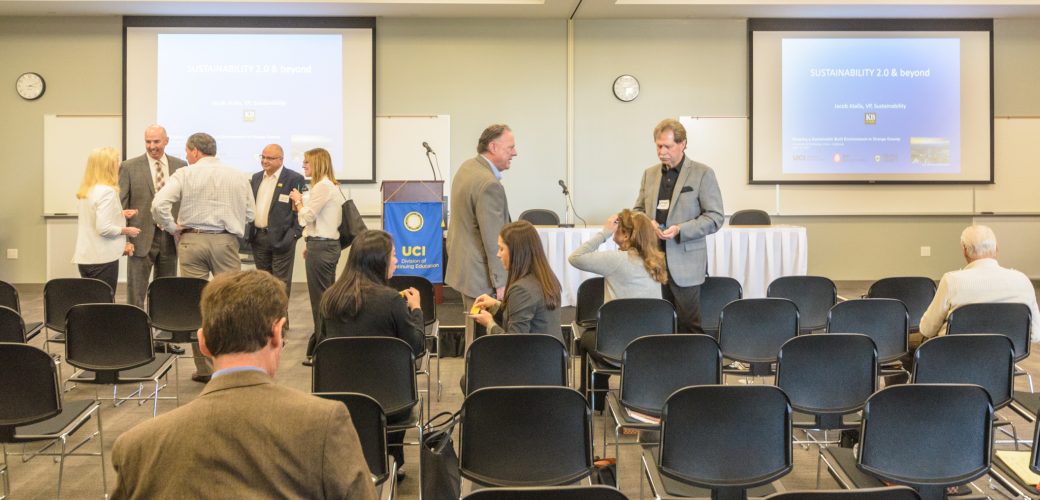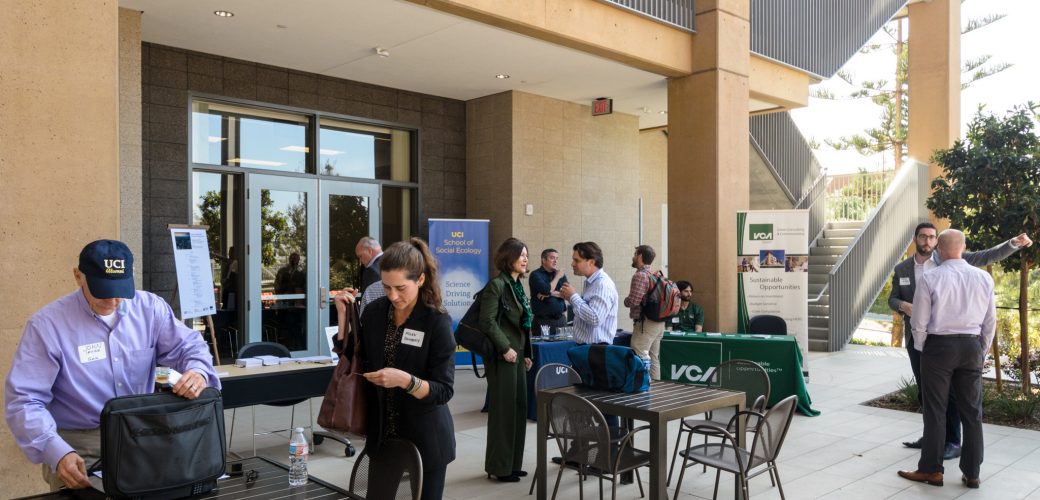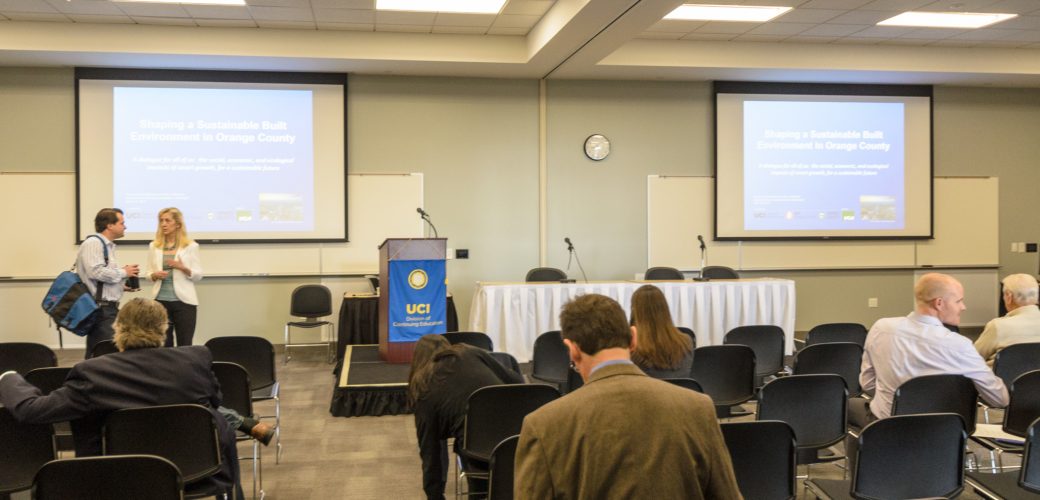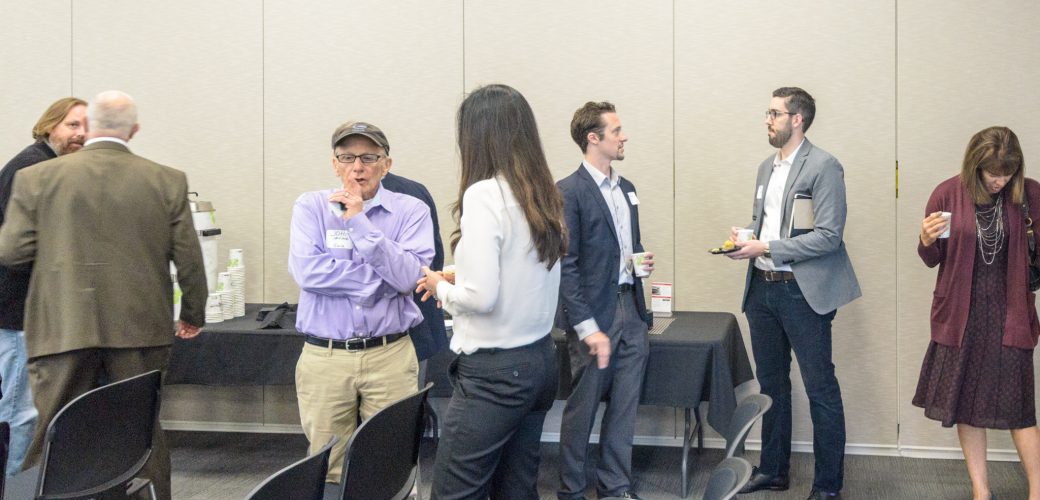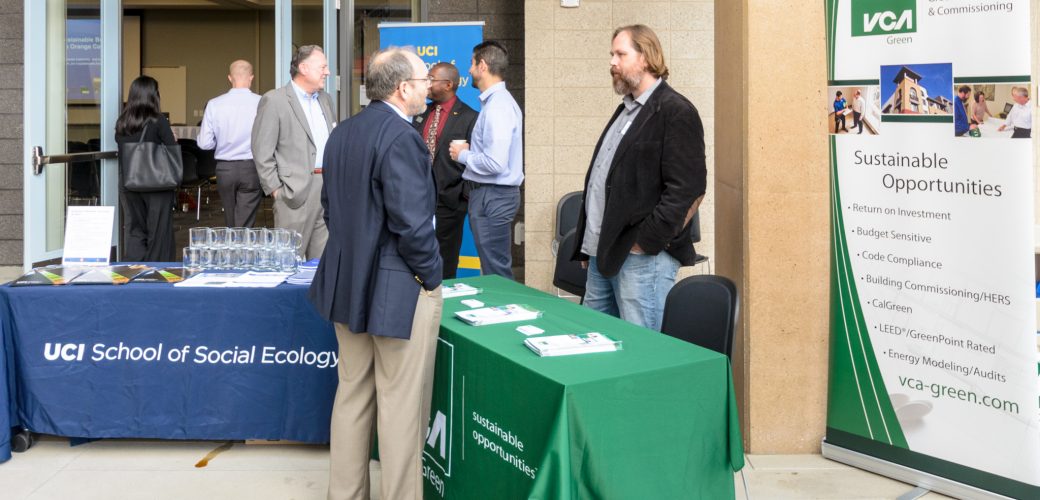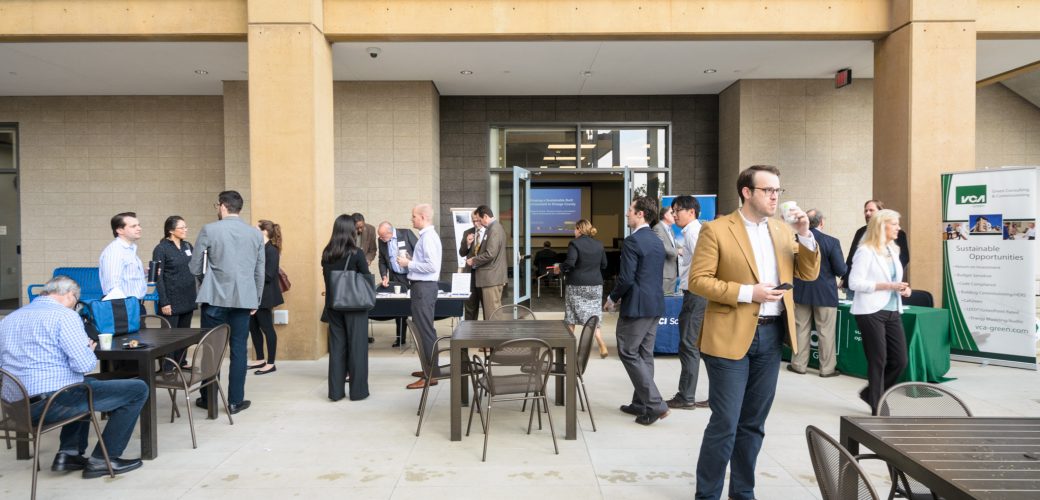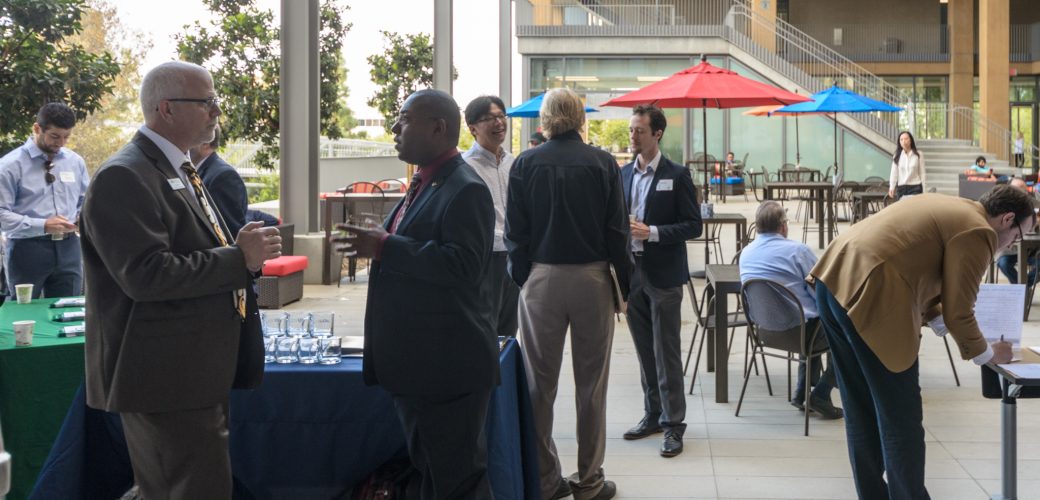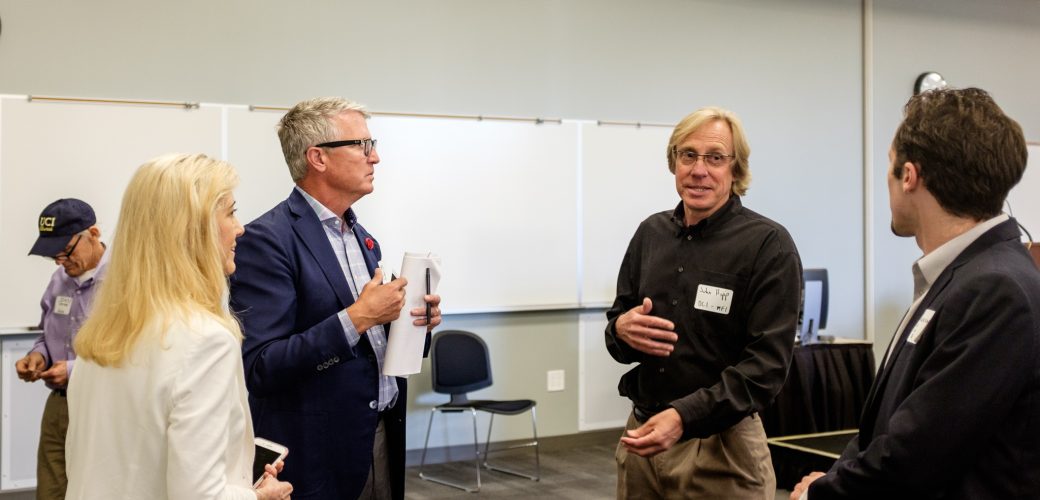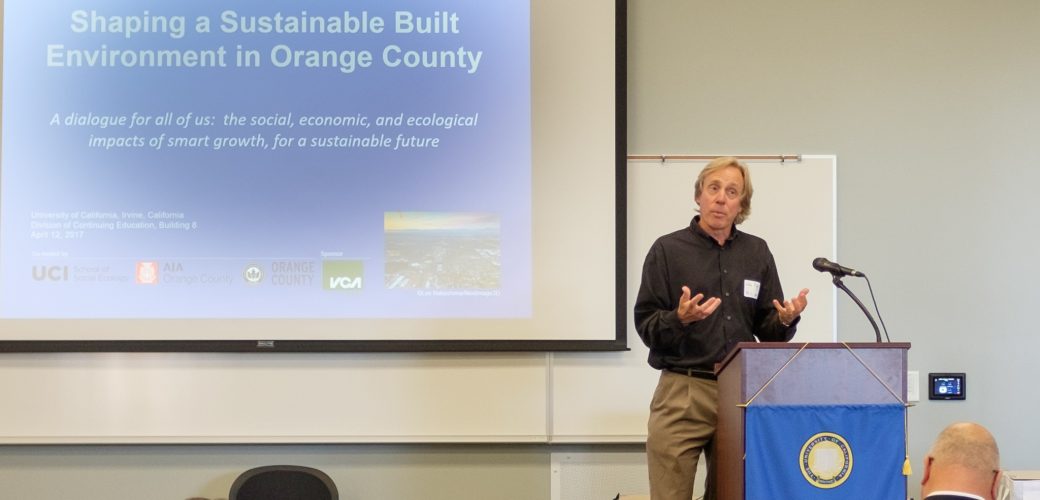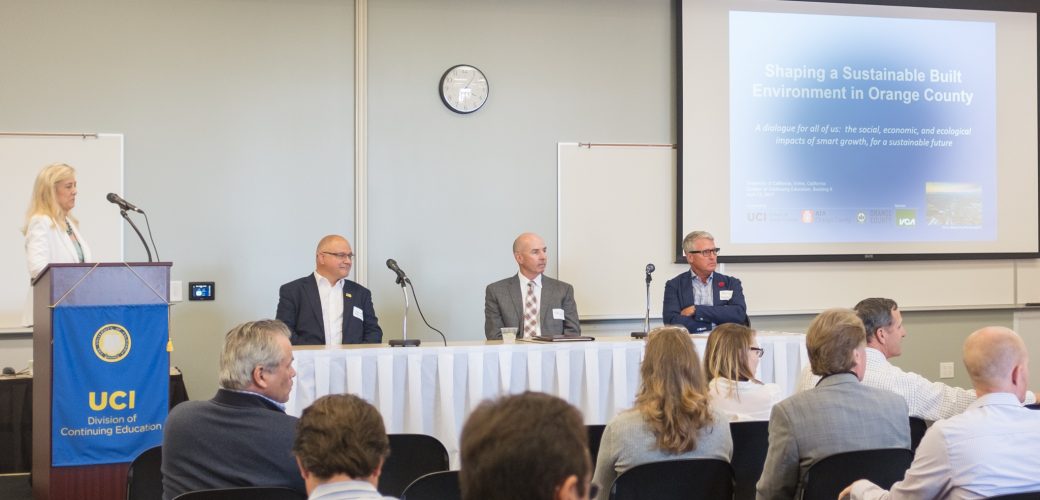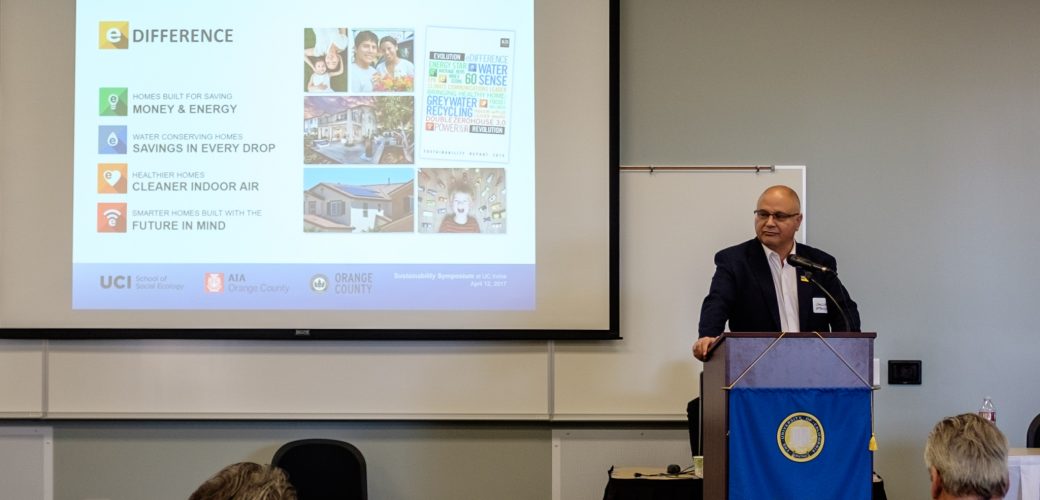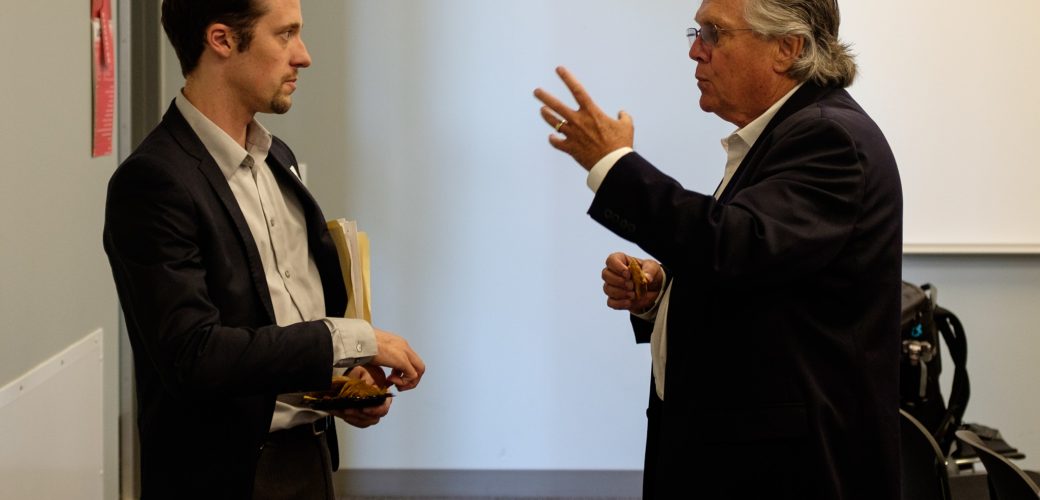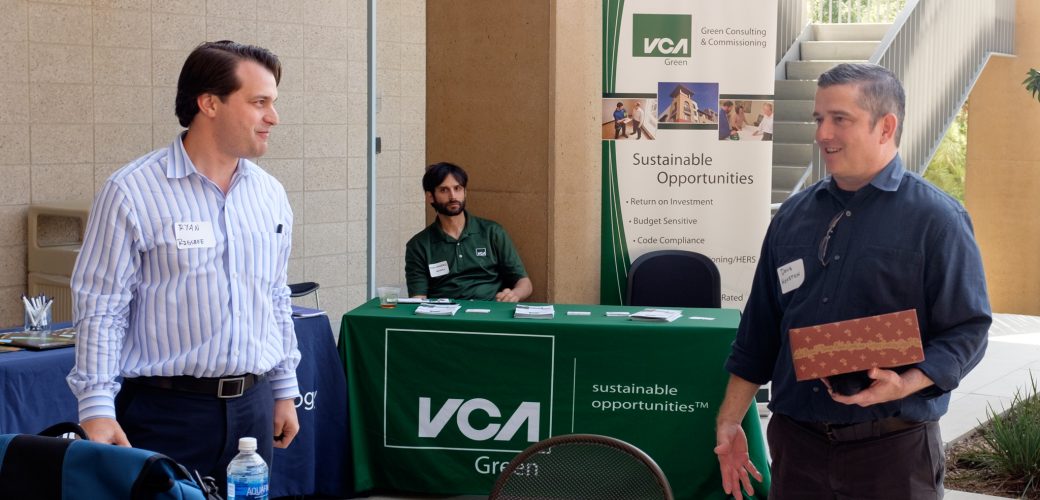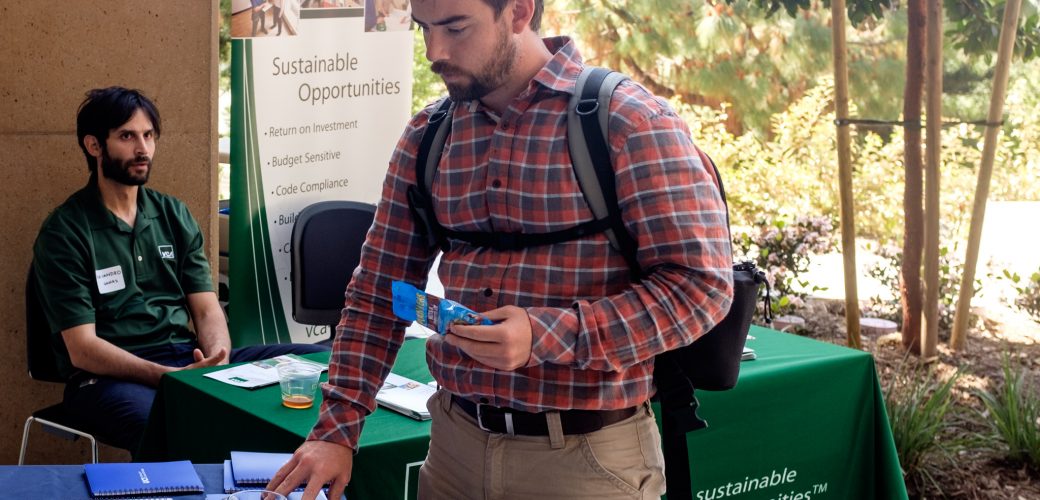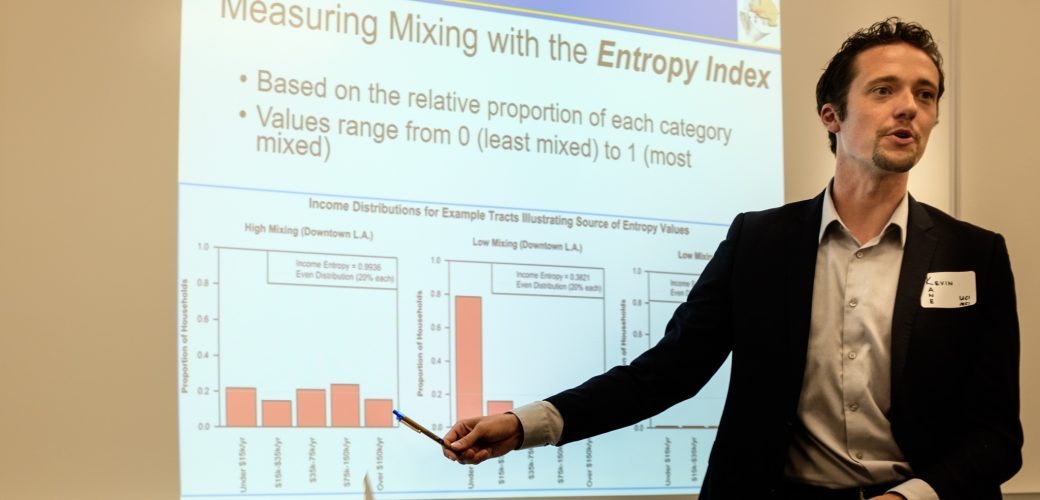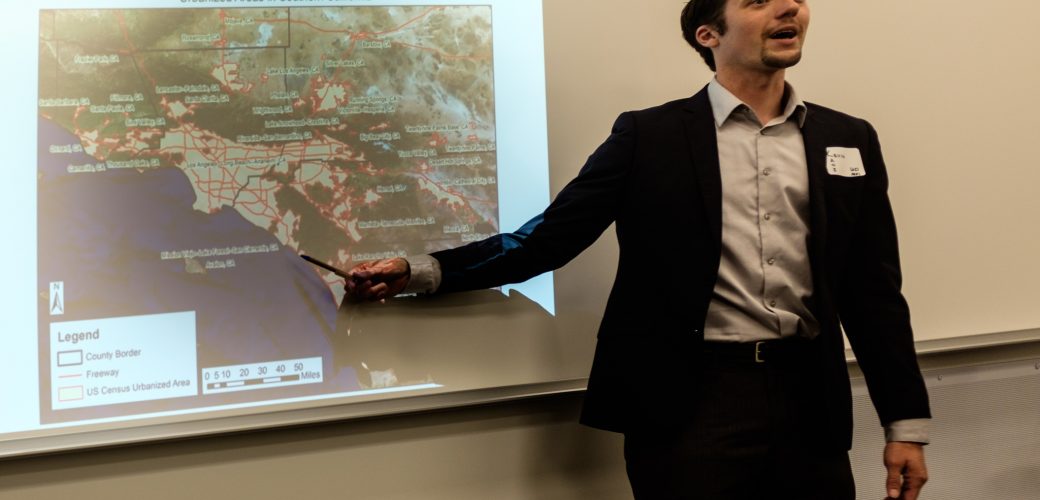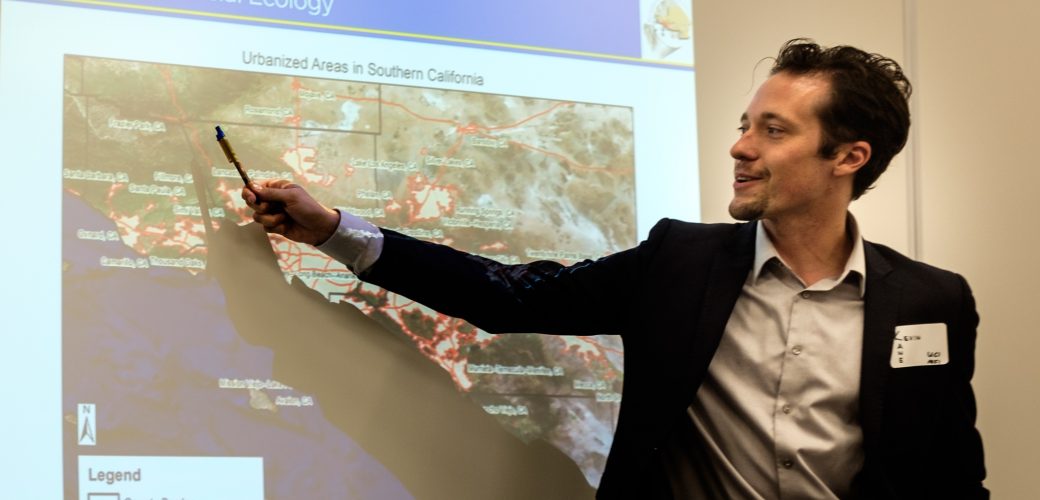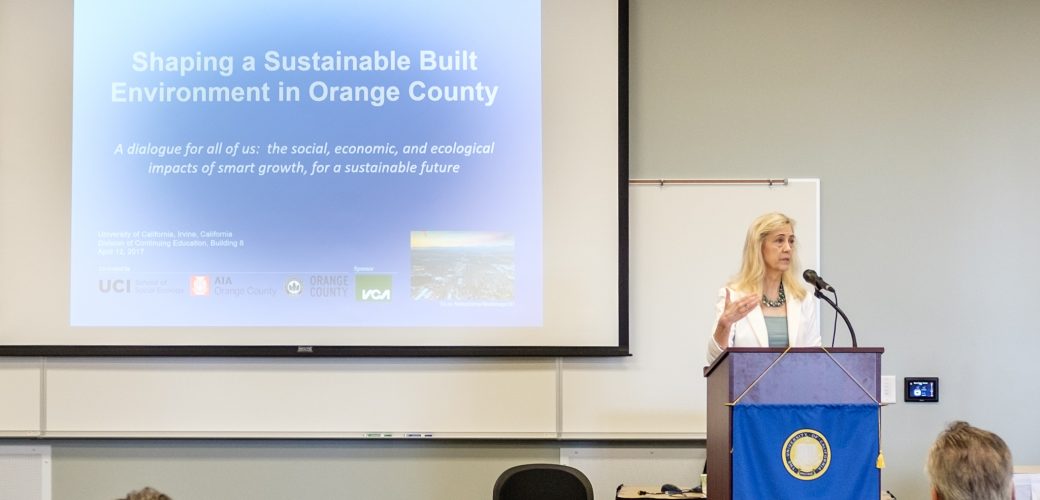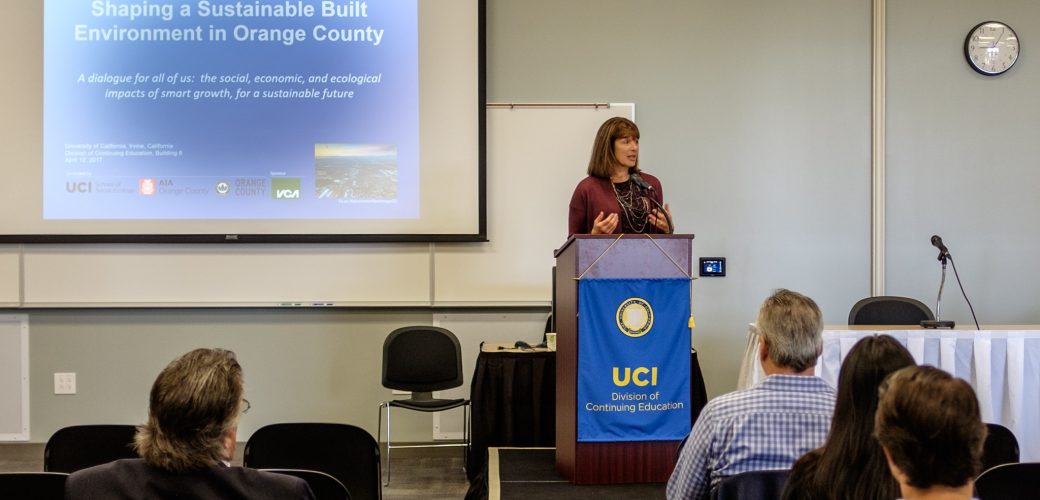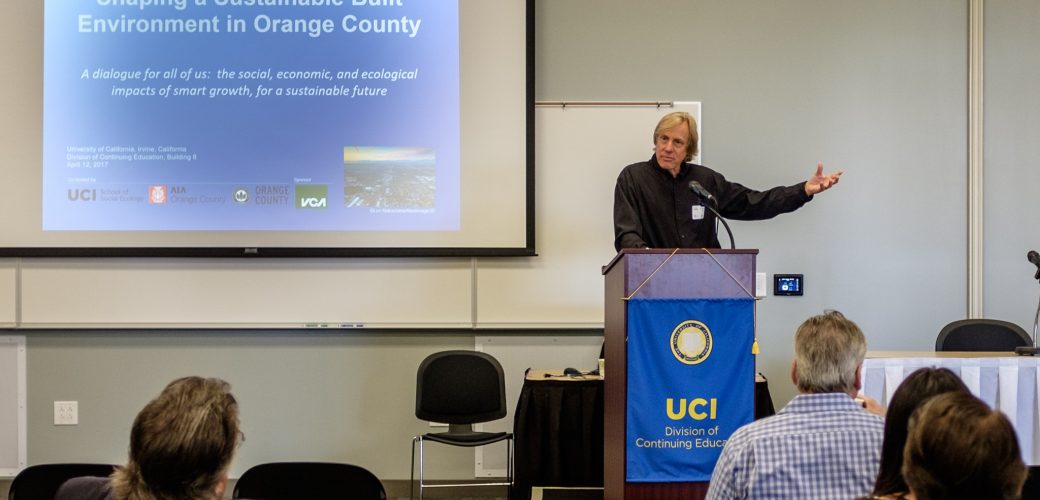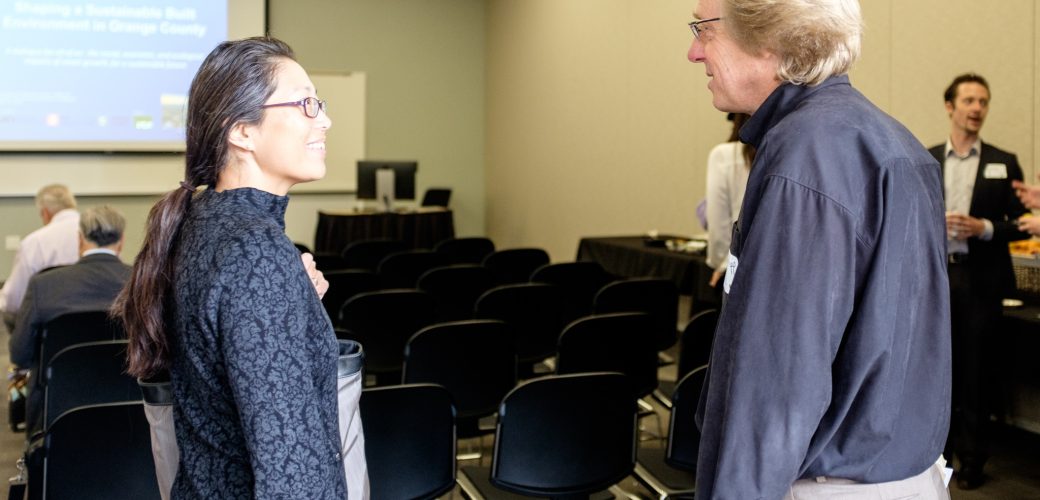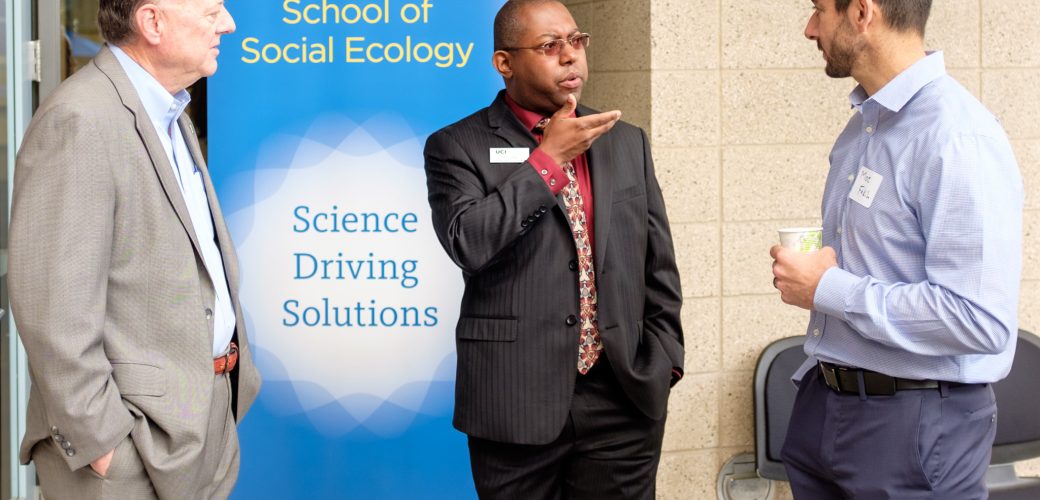“Shaping a Sustainable Built Environment in OC — A dialogue for all of us: the social, economic, and ecological impacts of smart growth, for a sustainable future” was a day-long symposium cohosted by Metropolitan Futures Initiative (MFI), an UC Irvine School of Social Ecology initiative, & AIA Orange County (AIAOC), a Chapter of The American Institute of Architects.
The symposium was held on April 12, 2017 from 8am-4:30pm at the University of California – Irvine.
We have now posted videos of the speakers:
- Here is the Welcome and Opening Remarks
- Here is luncheon keynote lecture on “Urban Change in Orange County: New Relationships between Housing, Business, and Open Space” by Kevin Kane and John Hipp
- Here are the Presentations by Jeanalee Obergfell and Michael Affeldt on “The pLAn” and “The Revitalization of the LA River”
- Here is Panel Discussion 1, discussing “Orange County Cities: Goals and Achievements for Sustainability”
- Here is Panel Discussion 2, with “Developers Highlighting Sustainable Projects and Discussing Future Trends and Goals”
Twitter Moments from the Symposium
Keynote Speakers
MICHAEL AFFELDT
Michael Affeldt is the Director of LARiverWorks at Office of Los Angeles. He is a graduate of the University of Michigan with Bachelors of Science degrees in Engineering and also Civil and Environmental Engineering. Before being the Director of LARiverWorks, he has worked at the Office of Los Angeles as an Assistant Director and Civil Engineering Associate.
PATRICK ALFORD
Patrick Alford is the Planning Program Manager at the City of Newport Beach. He oversees advance planning and special projects, including the recent certification of the City’s Local Coastal Program by the California Coastal Commission. Before working for the City of Newport Beach, he was a planner at the City of San Marcos, University of California at San Diego and the City of Oceanside. He is a graduate of the University of California at Santa Barbara with a Bachelors of Arts degree in Cultural Anthropology.
JACOB ATALLA
Jacob Atalla is Vice President of Sustainability at KB Home, where he leads KB Home’s initiatives to make every home it builds more environmentally friendly. Educated as an architect, Jacob has over 30 years’ experience with technology and green building. Recent projects include developing the 2016 Greenbuild KB Home Project, a sustainable concept home; expanding KB Home’s line of net-zero energy homes; building over 100,000 ENERGY STAR certified homes and 5,100 homes with solar PV; building the most WaterSense® labeled homes in the nation; and building more than 150 LEED Platinum certified homes.
jatalla@kbhome.com
WENDELL C. BRASE
Wendell Brase, UC Irvine’s Associate Chancellor for Sustainability, leads efforts by UCI and other University of California campuses to implement UC’s comprehensive Sustainable Practices Policy and achieve carbon neutrality in UC’s buildings and vehicle fleet by 2025. He co-chairs the University of California’s Global Climate Leadership Council and chairs UC’s Energy Services Governing Board. Under his leadership as Vice Chancellor for Administrative and Business Services, UCI earned numerous accolades for sustainability and was named to Sierra magazine’s Top 10 list of greenest campuses seven consecutive years, coming in at No. 1 in 2014 and 2015. UCI has 14 LEED Platinum and 10 LEED Gold buildings.
PAUL CATE
Mr. Cate is the Chief Executive Officer, Mark IV Capital, Inc., a regional real estate development company with offices in five western states. His career in real estate spans 35 years, and includes involvement in millions of square feet of ground up development. As the President and CEO of the firm Mr. Cate is responsible for the strategic direction of the company and managing the execution of corporate goals. He is a CPA; holds a master’s degree in Taxation; is a member of ULI, NAIOP, ICSC, UCI Center for Real Estate, and the UCI CEO Roundtable; and sits on several boards. http://www.markiv.com/
DAVID FELDMAN
David Feldman is a Professor of Planning, Policy, and Design and Political Science in the School of Social Ecology at the University of California Irvine. He is also the Director of Water UCI. David Feldman specializes in water resources management and policy, global climate change policy, ethics and environmental decisions, adaptive management and sustainable development. His current research is focused on green infrastructure and urban water policy, trans-boundary dispute resolution and water, flood risk communication, the water-energy policy nexus, and the challenges in achieving institutional reform to promote equity in water management.
JEFFREY GILL
Jeffrey Gill, FAIA serves as the Executive Director for AIA Orange County (AIAOC). Committed to adding value to AIA membership and dedicated to the future of the architectural profession and sustainability of our communities, Jeffrey creates and pursues unique programs and events for member added benefits. Practicing Architect and Executive Director, he works with and for the members to create a more unique AIA experience, providing insight from both the member and staff’s perspective for effective problem solving and leadership.
jgill@aiaoc.org
ANTONIA GRAHAM
Antonia Graham brings 15 years of experience managing sustainability and environmental compliance programs for municipalities. Currently she is the Assistant to the City Manager/Sustainability and Energy Manager for the City of Huntington Beach where she is leading a regional effort to create a circular economy. For the past year Ms. Graham has been leading the effort to acquire and retrofit 11,000 streetlights within the City to LED, this project will save 2.4 million pounds of CO2 and 3.5 million kWh annually. The City of Huntington Beach along with the University of California, Irvine and NREL was recently awarded $1.9 million to create an advanced energy community in a disadvantaged part of the City. Additionally, Ms. Graham works with businesses to help them achieve the Triple Bottom Line and recently launched a Sustainable Business Certification program in Huntington Beach. She holds a BA in Political Science and American Studies, an MPA with a concentration in Public Finance, and a Master’s degree in Sustainability from Arizona State University. Ms. Graham also teaches courses focused on sustainability at UCI, California State University Fullerton, and Irvine Valley College.
ANTONIA GRAHAM
Antonia Graham brings 15 years of experience managing sustainability and environmental compliance programs for municipalities. Currently she is the Assistant to the City Manager/Sustainability and Energy Manager for the City of Huntington Beach where she is leading a regional effort to create a circular economy. For the past year Ms. Graham has been leading the effort to acquire and retrofit 11,000 streetlights within the City to LED, this project will save 2.4 million pounds of CO2 and 3.5 million kWh annually. The City of Huntington Beach along with the University of California, Irvine and NREL was recently awarded $1.9 million to create an advanced energy community in a disadvantaged part of the City. Additionally, Ms. Graham works with businesses to help them achieve the Triple Bottom Line and recently launched a Sustainable Business Certification program in Huntington Beach. She holds a BA in Political Science and American Studies, an MPA with a concentration in Public Finance, and a Master’s degree in Sustainability from Arizona State University. Ms. Graham also teaches courses focused on sustainability at UCI, California State University Fullerton, and Irvine Valley College.
ANTONIA GRAHAM
Antonia Graham brings 15 years of experience managing sustainability and environmental compliance programs for municipalities. Currently she is the Assistant to the City Manager/Sustainability and Energy Manager for the City of Huntington Beach where she is leading a regional effort to create a circular economy. For the past year Ms. Graham has been leading the effort to acquire and retrofit 11,000 streetlights within the City to LED, this project will save 2.4 million pounds of CO2 and 3.5 million kWh annually. The City of Huntington Beach along with the University of California, Irvine and NREL was recently awarded $1.9 million to create an advanced energy community in a disadvantaged part of the City. Additionally, Ms. Graham works with businesses to help them achieve the Triple Bottom Line and recently launched a Sustainable Business Certification program in Huntington Beach. She holds a BA in Political Science and American Studies, an MPA with a concentration in Public Finance, and a Master’s degree in Sustainability from Arizona State University. Ms. Graham also teaches courses focused on sustainability at UCI, California State University Fullerton, and Irvine Valley College.
MATT GUDORF
Matt Gudorf has led UC Irvine’s energy management group for the last 5 years. The culmination of his leadership has been record breaking energy efficiency project completion under the UC/CSU/IOU Energy Efficiency Partnership. Matt’s work as the Campus Energy Manager has focused on all aspects of energy management including energy procurement, distributed-generation, energy efficiency, and microgrid strategies focusing on business continuity. His commitment to sharing his team’s best practices and lessons learned with the greater community has helped raise the profile of professional energy management and challenge peer institutions to follow in UC Irvine’s footsteps.
NANCY GUERRA
Nancy Guerra is the Dean of the School of Social Ecology and a Professor in the School’s Department of Psychology and Social Behavior at the University of California, Irvine. Her research focuses on preventing youth violence and promoting healthy youth development. She has been the lead investigator for a number of large scale projects, including the Southern California Academic Center for Excellence on Youth Violence Prevention (2000-2011) funded by the Centers for Disease Control and Prevention. More recently she has been involved in international programs, as Associate Provost and Senior International Officer at the University of Delaware (2011-2015), and as a consultant for international agencies including The World Bank, the Inter-American Development Bank, and USAID. She currently serves as co-chair for kNOw Violence, a global initiative to prevent violence in childhood sponsored by the Public Health Foundation of India.
JOHN HIPP
John Hipp is a Professor of Criminology, Law and Society, Planning, Policy, and Design in the School of Social Ecology at the University of California Irvine. He is also the Director of the Metropolitan Futures Initiative. His research interests focus on how neighborhoods change over time, how that change both affects and is affected by neighborhood crime, and the role networks and institutions play in that change.
JOHN HIPP
John Hipp is a Professor of Criminology, Law and Society, Planning, Policy, and Design in the School of Social Ecology at the University of California Irvine. He is also the Director of the Metropolitan Futures Initiative. His research interests focus on how neighborhoods change over time, how that change both affects and is affected by neighborhood crime, and the role networks and institutions play in that change.
DOUG HOUSTON
Doug Houston is an Associate Professor of Planning, Policy and Design in the School of Social Ecology at the University of California, Irvine. His research investigates how urban development patterns intersect with neighborhood livability and environmental quality. These themes are evident in four overarching and interrelated areas of his empirical work: (A) impacts of transit-oriented development, (B) human activity patterns and environmental hazards, (C) urban inequality and access to opportunity, and (D) geographic analytical methods. His scholarship contributes to several literatures – transportation and environmental planning, environmental health science, public health, and geography – and expands each by helping explain how places and policies influence people, behavior, and community health.
MARTIN HOWARD
President / CEO, Howard CDM
With close to 40 years’ of experience in the industry, Martin has grown the small family business his father began in 1972, into a successful multi-million-dollar company. He has been involved in many successfully completed commercial, hospitality, educational and mixed-use developments. The company’s more prominent achievements in construction include Laemmle Theatres, Orange County School of the Arts and Otium Restaurant. In the realm of development management, notable projects consist of The Pike at Rainbow Harbor, City Place in Long Beach and The District in Tustin. Martin has also played a major role in the revitalization of a mile-long corridor along Long Beach Boulevard in Bixby Knolls.
www.howardcdm.com/
KEVIN KANE
Kevin Kane, PhD is a postdoctoral fellow at University of California Irvine’s Metropolitan Futures Initiative. He is an economic geographer interested in land-use change, neighborhood change, and economic development. He focuses on applying cutting-edge geographical and statistical methods toward understanding long-term changes in cities using high-resolution data. His work in Chicago, Phoenix, and Southern California highlights how changes in the built environment – namely, development and the policies surrounding it – are related to social outcomes like employment, accessibility, and sustainability. His work has been published in journals including Urban Studies, the Professional Geographer, and the Journal of Planning Education and Research.
www.kevinkane.org
SCOTT KITCHER
KENNETH NILMEIER
Kenneth Nilmeier is Principal and Director of Planning of MVE + Partners. Since joining the firm more than 25 years ago, he has overseen the firm’s key master planning projects including specific plans, brownfield redevelopments, feasibility studies, and large-scale urban master plans. His wide range of expertise includes planning for residential and mixed-use communities, commercial developments, educational campuses and luxury resorts. He stresses contextualization, flexibility and site-specific solutions that meet client needs and make positive changes for the community. His planning success is a result of long and careful thought on the best possible use of land, and the blending of design objectives, physical site opportunities, and economics to meet site-specific goals.
JEANALEE OBERGFELL
Jeanalee Obergfell is a Policy Analyst for Mayor Eric Garcetti’s Office of Sustainability. She played a key role developing the City of Los Angeles’ first Sustainable City pLAn. She leads and supports the implementation of city initiatives around air quality, livable neighborhoods, and environmental justice. Notably, she was the Mayor’s Office lead on the Clean Up Green Up policy which combats adverse health effects related to concentrations of industrial uses and freight traffic in three L.A. pilot communities — Boyle Heights, Pacoima/Sun Valley and Wilmington. She is a proud University of California Los Angeles graduate, having earned both her BA in Political Science and a Master’s in Urban and Regional Planning from there. She is an alumna of the Coro Fellows Program in Public Affairs.
https://www.lamayor.org/plan
ALEX TUREK
Alex Turek is the Multifamily Development Manager of GRID Alternatives. Born in Huntington Beach but raised in New York, Alex came back to Los Angeles to pursue his Master’s degree in Urban Planning at UCLA. His studies focused on regional planning for climate change. This led to a research manager position with the UCLA Luskin Center for Innovation where he led both the sustainable energy and electric vehicle and alternative fuels initiatives. Alex took a position with GRID GLA in May of 2016 to help develop the organization’s multifamily program. He is extremely excited to be a part of such a devoted and talented team. In his free time, Alex enjoys discovering the many cultural quirks of Los Angeles or getting away from the city and exploring all that California’s beautiful nature has to offer.
http://www.gridalternatives.org/
VICTOR VAN ZANDT
Victor Van Zandt is the Vice President of Planning and Construction at Irvine Campus Housing Authority. For the past 18 years, he has directed the development of University Hills, the largest workforce housing planned community in the nation. University Hills currently consists of 1066 for−sale homes and 360 rental units on 300 acres located on the campus of University of California, Irvine. An additional 56 units are under construction and 230 are in various stages of planning. Victor received a Masters of Urban and Regional Planning (MURP) from the University of California, Irvine in 1999. As a ULI member, he has served on the Housing, Sustainable Communities, and Public Spaces Initiative Councils at the Orange County/Inland Empire district council. He is a founding member of the Council of Academic Workforce Housing, founded in 2006, as well as President of the UC Irvine MURP Alumni Council. In his free time, Victor enjoys speaking at local university planning classes, mentoring students, mountain biking, travelling to National Parks, and spending time with his wife, a professor of teaching at UC Riverside.
Presentations
THE PLAN AND RIVER REVITALIZATION FOR LOS ANGELES
Helping to Inform Sustainability in Orange County
PRESENTATION
On April 8, 2015, Mayor Eric Garcetti released L.A.’s first-ever Sustainable City pLAn. The pLAn is both a roadmap to achieve back to basics short-term results while setting the path to strengthen and transform L.A. in the decades to come. To reach the targets in the pLAn, the Mayor is calling upon organizations, universities, neighborhood councils, community groups, businesses, and individual Angelenos to commit to “Adopt the pLAn” into action. Since the release of the pLAn over 60 organizations, companies and individuals have made commitments to “Adopt the pLAn” into action.”
https://www.lamayor.org/plan
The Los Angeles River flows through diverse communities throughout Los Angeles. The river presents opportunities to revitalize neighborhoods, to invest in communities, to bring nature to people, and to enhance the quality of life. The City is committed to bringing this vision to life through partnering with communities, businesses, organizations, and other jurisdictions, coordinating and securing funding, and strongly advocating for a renewed and healthy river.
http://lariver.org/master-plan
ORANGE COUNTY CITIES
Goals and Achievements for Sustainability
PANEL DISCUSSION
Now, more than ever with the increasing density of population, buildings, traffic, and other factors that affect the environment and its inhabitants, residents and leaders of Orange County are beginning to understand the importance and the need to preserve and protect the environment and to develop the built environment with a far-reaching vision. Presenters in this panel discussion will share how their organizations are establishing plans for healthy, livable communities and how they are working towards achieving their goals to create sustainable, resilient communities.
PRESENTATION
URBAN CHANGE IN ORANGE COUNTY
New Relationships Between Housing, Business, and Open Space
KEYNOTE
Changes to the urban built environment have impacts on the social and ecological footprint of cities and regions long beyond their original planned lifespan. In particular, urban sustainability, transportation energy use, and community well-being and cohesiveness are largely determined by development decisions that led to the way our cities are arranged. This research explores the notion of urban accessibility, defined as the spatial separation between dwelling units and 32 types of destinations including shopping, open space, and public services. Using data on the roughly five million residential land parcels in Southern California, we use network analyses and multilevel regression modeling to determine what it is about homes that make them more or less accessible to a wide variety of destination types. In most places across the region, older homes, smaller homes, and multifamily residences have a positive relationship to accessibility; however this varies widely across counties and cities. The spatial structure of Orange County, in particular, results in some of the highest levels of accessibility between homes and open space. Despite very limited access to passenger rail, Orange County homes have comparable or better spatial proximity than Los Angeles County homes to restaurants, apparel retail, and financial services.
For the detailed report of the keynote presentation, please go to the Metropolitan Futures Initiative Quarterly Report site: https://mfi.soceco.uci.edu/category/quarterly-report/
DEVELOPERS HIGHLIGHTING SUSTAINABLE PROJECTS AND
DISCUSSING FUTURE TRENDS AND GOALS
PANEL DISCUSSION
Developers, with different fields of project-type expertise, will share their experiences of working on sustainable projects and how their companies have established collaborative working relationships with other organizations and communities to develop such projects. They will also share their insights on the ways the development and construction industries are evolving and developing, with a goal to provide thriving communities.
Breakout Sessions
ENERGY AND THE BUILT ENVIRONMENT
The University of California, Irvine’s aggressive energy-management program has been in place for more than two decades and has enabled the campus to reduce its energy use per square foot across the UCI campus by 50%. The campus currently has 14 LEED Platinum and 10 LEED Gold buildings, among the most at any campus in the United States. Join Wendell Brase, UCI’s Associate Chancellor for Sustainability, and Campus Energy Manager Matt Gudorf, for an overview of the campus’s award-winning Smart LabsTM Initiative and UCI’s current practice of incorporating energy efficiency into the design-build process.
https://betterbuildingssolutioncenter.energy.gov/implementation-models/developing-integrated-%e2%80%9csmart-lab%e2%80%9d-program
TOWARD WATER-SUSTAINABLE CITIES – RECONCILING THE BUILT AND NATURAL ENVIRONMENTS
In the face of protracted drought and climate change, California cities face numerous challenges in protecting water quality while also providing adequate water supply. This presentation highlights efforts being pursued locally – and elsewhere – to adapt the built environment to capture stormwater, alleviate flood flows, and improve water quality. Commonly labelled “low impact developments” or water sensitive design, we prefer to term water sustainable design since their objective is to rely on unconventional approaches to remake cities in ways that ensure future water resilience. While practical, these approaches face numerous challenges from the standpoint of financing, politics, and public acceptability, and will require cooperation between architects, designers, urban planners and others to successfully implement.
HOUSING
In this break out session, residential trends in California will be discussed, including those in Orange County. Case studies will be presented, especially projects that have been designed to promote vibrant, healthy, and resilient communities. Discussion will include what measures should be considered for Orange County to develop sustainable residential projects that are connected to and integrated with other areas of the built environment.
DENSITY AND DEMOGRAPHICS
Orange County and Southern California in general, are at a crossroads. While the planned community model of prosperity and well-being has served many in the region well for a number of decades, clear demographic and environmental changes are afoot. In particular, Orange County residents are older and homes are decreasingly affordable, while the environmental impacts of human activity – namely energy and water use and carbon emissions – are increasingly clear. Housing density has been on the rise across California in the last decade, while socioeconomic “mixing” in neighborhoods has been increasingly linked to positive outcomes such as income growth and job growth. This breakout session will feature a presentation and discussion on several of these trends as they relate to sustainable built environments.
TRANSPORTATION
Doug Houston will present his expertise in how urban development patterns intersect with neighborhood livability and environmental quality. This session will also include topics such as transportation and environmental planning.
INNOVATION
More information coming soon!
